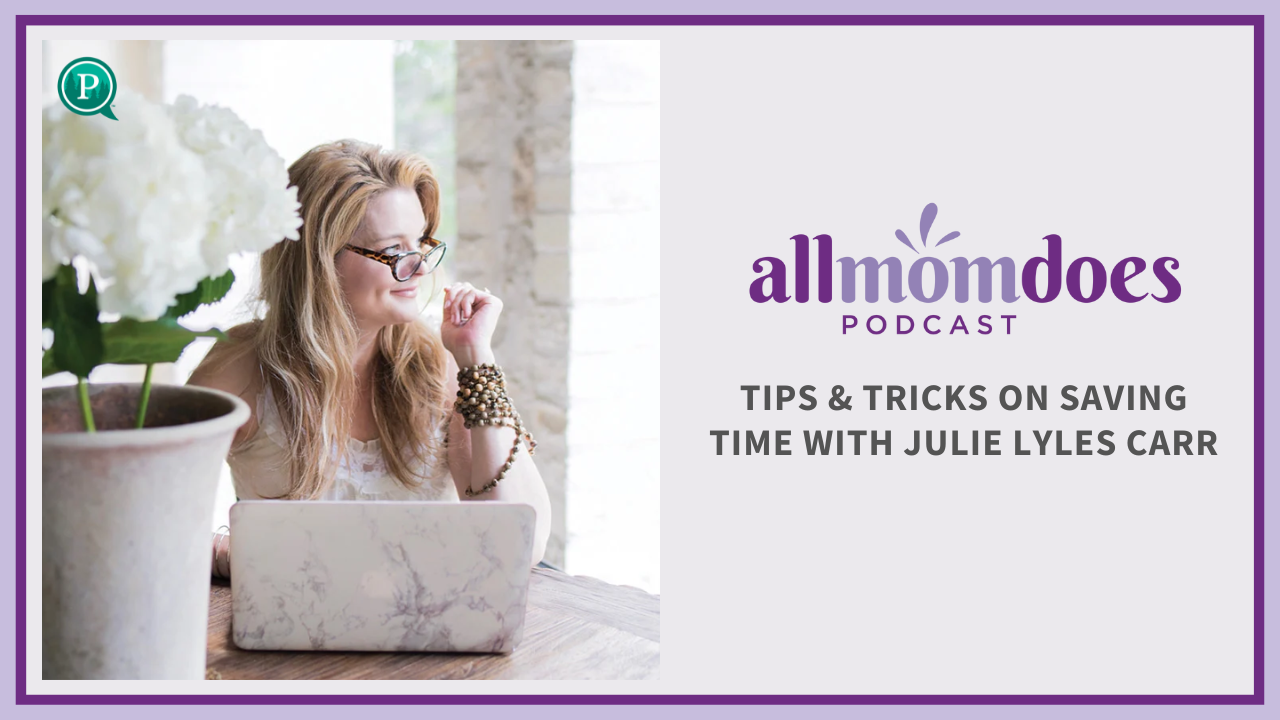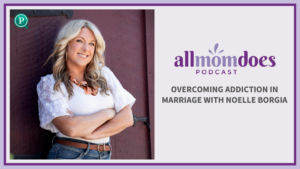There are four letters you need to know when it comes to how you’re spending your time. The AllMomDoes Podcast host Julie Lyles Carr talks about the four principles she’s learning to use when it comes to how she looks at productivity, ‘wasting’ time, comparison, and more!
Show Notes:
Find Julie: Online | Instagram | Facebook | Twitter | Pinterest
AllMomDoes: Instagram | Facebook | Twitter
Transcription:
Julie [00:00:15] What if I could give you four letters to think about when it comes to how you spend your time, how you’re spending your days? I am Julie Lyles Carr, I’m the host of the All Mom Does podcast. We’ve been on a series about time and what it means to us, how we spend it, the ways that we can come up a little bit higher, the things we should probably be considering about where we’re spending time. This all kicked off because as I shared with you back in the episode, that was the introduction to this series. I recently became a grandmother and my head cannot get around it. Like, I can’t figure out how the time has passed that my oldest children are old enough. First of all, I have four of them now married off, which has all happened very quickly in just the last three years. And then becoming a grandmother. I’m like, wait a minute. Woo! This train is moving fast. So what are the little bits of wisdom, the mistakes, the things I wish I’d done differently, the wisdom that I’ve gained from the guests we’ve had on. That’s what we’re going to talk about today. It’s about time. And this is the wrap up.
Julie [00:01:22] We have had several people on who I think have given us a really beautiful, rounded view of time, because I got to be honest, when I think about time, the main thing I’m always trying to figure out is how to cram more in. And maybe that’s you? Crystal Paine was on. Go back and take a listen to that episode, because I thought it was really powerful. That was back on The Time Saving Mom with Crystal Paine, and she talked through a lot of the things that she’s had to think about as they have ended up having three more kids after their initial three children. And she finds herself back working with little babies and soon to be preschoolers in the midst of also trying to do high school graduations and driver’s license for the older kids. So she has some great tips. I also loved my time with Jen Pollock Michelle, where she got us to focus a little bit more on some of the spiritual side of time and what it means. And then, of course, we also had on Hannah Keeley, who is considered America’s number one parenting coach, and she talked about that time where we can all get into when mom brain fog is really hitting us hard. So if you haven’t had a chance to check those out, be sure and do that. But today I have tried… Okay, I’ve tried so hard to come up with this super clever acronym that was going to really, really mean something. And I had been down all kinds of bunny trails only to arrive here. I don’t have a super clever way to put this out there, but I do have four letters that I want you to think about when it comes to how you’re spending your time. They end up spelling Cavi. It’s going to be C-A-V-I. And no, I can’t make cavi mean anything. It does have a couple meanings, like it’s the plural for like cave systems or the caves of your foot. I don’t know. My apologies. I was really trying to make it cute, but I do want you to remember these letters C-A-V-I. What that means when you think about time. When I think about the lessons I’m learning about time, it’s capacity, attention, vitality and intention. So I’m going to say those again. It’s capacity, attention, vitality and intention. Cavi, C-A-V-I. Because I have the number of kids I do and because some of the things that I’ve been really blessed to be able to do in my life have been a little more public. A lot of times when I sit down with a mom who wants to bend my ear, wants to have a cup of coffee, wants to chat. One of the things that she will often say to me is, “I don’t understand how you get so much done.” I appreciate it and at the same time I have to tell you, I am forever looking at other women who I think are getting so much more done then I’m getting done.
Julie [00:04:11] If there’s ever an anecdote in my life for comparison, and comparison is one of those things that I battle. You may battle it too. I’m always looking at my results compared and contrasted to someone else’s. I’m always looking at how clean my kitchen is compared to somebody else. I’m looking at all those kinds of things. But if there’s ever anything that helps me reframe and release some of the comparison that I seem to get a little stuck in sometimes, it is this concept of capacity. I have got to tell you, I’m believing more and more strongly that God gives each of us an individual capacity for what we are supposed to manage, handle various thresholds for how He put us together in terms of the different things that we can deal with. I’ve had people say to me because of the number of children I have, well do I think that everybody should have that many kids? I’ve often laughed and said, “Look, I am not here to speak into anybody’s choices between them and God about how they’re going to build their family.” What I do know is that very much to my own surprise, through nothing that I did, God gave me a capacity to deal with the levels of chaos that come with big family life. For whatever reason, He granted that to me. So I was able to have the capacity in my own make up for how He designed me to be a mom to this many kids. You may have the capacity for A kid, and that is fantastic because that’s how God has put you together. You may have the capacity for double the number I have and God bless you and that’s amazing. But I think so often when we see someone who’s doing something that seems to be a little bit bigger in number or reach or it’s more organized or they seem to be producing something more, whatever, we for some reason can begin to think that that’s the capacity that we are supposed to have. But capacity is not a one size fits all. For example, just in the very way that our brains are wired, some of us can handle more noise or more inputs, or we can handle a bunch of stuff coming at us and other people, that does not work for them. Their capacity for that is different. They may have a higher capacity in another area. So even the way that God knit you together, the way He wired your brain, how are you honoring that in what you see as your capacity for doing things? We can really struggle at times because we have an agenda or an organization we’re part of has an agenda or the school where our kids attend or the church where we go. They have an agenda for needs that they need met. They can see us and they can say, I need you to do X, Y, Z without a thought to what our individual capacity is. We have to be the ones between us and God to both discover and honor the capacity He’s given us. He wired you for a certain level. Yes, God is at times going to ask you to stretch. He’s going to take He’s going to take you on a journey at times where He asks you to take on more than maybe what you think your capacity is. But I want to remind you, make sure that if you are in a place where you’re feeling stretched, where you’re going a little further, make sure that’s a direction you’ve had from God. That it’s not a peer pressure thing. It’s not a pressure thing for a volunteer situation. It’s not yet another work project that your boss, who really pushes hard, is saying he needs you on whatever the thing is. Be sure to double check it against who God designed you to be and what your brain wiring is.
Julie [00:08:06] I think there’s also in this notion of capacity training. I was recently watching a kid who was practicing a particular sport at a very young age with their parent, and they were training their brain over and over and over and their musculature how to do this certain movement for this particular sport. And this kid was little, I’m telling you, little bitty. And I thought, wow, if that training keeps up until this child reaches adulthood, that kid will have practiced that moves so many times that their capacity for performing in this sport is likely going to be a lot higher and for a lot longer than somebody who maybe picked this up in adulthood. I have laughed because, you know, my oldest kids were raised in the chaos of a big family. And even though now when they come home and it gets crazy and loud and all of the things, it does make them really tired. And a lot of times they disappear upstairs to take a nap. I will say that when they go into situations where there is a lot of people and a lot of noise and a lot of different inputs and things that need to be attended to, they’ve had a different training because of their upbringing, just by virtue of the fact they grew up in our house. They have a different capacity for some of that than someone who maybe grew up in an environment that was a lot more scheduled and quiet and reasonable and not as wild as our house. So be sure and honor the training that you’ve also had. There’s the brain wiring there, the experiences that you’ve had in terms of how much you can pack or maybe should or should not pack into a day and into your life. All of those things matter. God designed you specifically. It’s not that you should be living life feeling like you’re always falling behind or you’re not measuring up or you’re not getting as much done as the woman across the street or at the desk next to yours. You have an individual capacity. King Solomon, He was somebody who had capacity for getting a ton of stuff done. But I love what he says, and I’m going to read from the Message Bible because it actually uses the word capacity in this translation. This is from Ecclesiastes 5:18-20, “After looking at the way things are on this earth. Here’s what I’ve decided is the best way to live. Take care of yourself, have a good time, and make the most of whatever job you have for as long as God gives you life. And that’s about it. That’s the human lot. Yes. We should make the most of what God gives both the bounty and the capacity to enjoy it. Accepting what’s given and delighting in the work. It’s God’s gift. God deals out joy in the present. The now. It’s useless to brood over how long we might live.” So take a look for yourself at that translation. Again, that’s Ecclesiastes 5:18-20. I think it’s really a beautiful way to just see the wisdom of somebody who had tremendous capacity but also understands that God is the one who gives capacity when it comes to how we spend our time.
Julie [00:11:12] All right. The A of that C-A-V-I of that CAVI acronym that I can’t make mean anything. Attention, attention. My husband and I were both oldest kids. We both were absolutely products of the yuppie influence. I mean, we came out of college feeling like it was our job to conquer the world, to conquer corporate life, to conquer interpersonal life, to conquer, conquer, conquer. And part of what we both have spent a lot of time trying to figure out is how to be more productive. Because it wasn’t enough to just be productive. We needed to be more productive. I’m really glad that somehow my kids growing up this way and let me tell you all of them, I would completely understand if they fell down the rabbit hole that Mike and I have just been wandering down for many years of trying to be more productive and get more done and stay later and all the things I would understand if that’s what they’ve decided they’re going to be doing or that’s just what they do just by example, I’m really thankful that to this point, the kids who have launched, they love to work hard. They want to show up with integrity, but man, they know how to shift their attention at the end of a work day back to their own interpersonal lives and their relationships. It is an area I have really struggled. Mike and I have a friend who’s an author. She does a lot of work in the business space. She realized that while she was getting a lot of inquiries for consulting on how to help employees and leaders be more productive, she decided that that really was not the thing to be focused on. Her name is Maura Thomas. She has a book called Attention Management, and that title tells you what she figured out, that it’s not about trying to get more productive or more organized. It’s about what you are paying attention to and then paying attention to what you’re paying attention to when it comes to your time. I confess I cannot believe how much time when I think about it, in aggregate, I have spent worrying about things that there’s nothing I can do about worrying about what people think of me, worrying if they think of me at all. And then I have this other cute little thing I do trying to predict all kinds of stuff where I go, Well, let me think about this. If it happens this way or what if it happened that way or What if this happened? Then I need to have plan A, B, C, D, E, F all the way to Z. I have at times focused very heavily on things that I don’t like. I don’t like how that turned out or I don’t like how that’s going, or I focused a lot on the things that are missing Instead of giving attention to what is here and what is now, and giving attention to what I’m giving attention to so that I can course correct as I need to. I’ve been bad at it. I want to get better at it to really understand that it’s not about where you spend your time per se. It’s about where you spend your attention. What are you paying attention to that is life giving that takes you to a place of trust in God? That helps you be present in this present moment because you can attend to what’s right in front of you instead of something that happened in the past or something that you’re worrying about happening in the future. When I look at Jesus talking about, Hey, live today, tomorrow has enough worry on its own. Don’t worry about that. Stay in the today. I’ll be like, Jesus is the one who was the originator of the idea of teaching about where you spend your attention is where you’re spending your time. So I’m going to get better. And if this is something you struggle with, I want to encourage you pay attention to where you’re paying attention because that is how you are spending your time.
Julie [00:15:21] Now the V of the C-A-V-I is vitality. Now, the way that we often think about vitality is we’re like, Oh, she has so much vitality, she’s so sparkly and she’s got so much energy and she’s so this and yes, vitality in the way that we often use it speaks to vibrancy. It speaks to being light in a room. It speaks to bringing that great sense of just being someone who’s happy and on top of things and has a lot of life force to them. But it comes from the root word of vital. What is vital to survive. I’ve come to see that we can’t really have vitality if we haven’t settled what is most vital in where we are investing our time. I have to tell you, I worked for a long season in ministry and in the nonprofit space, and the work I was doing in both of those areas was really important work. It was helping people in their spiritual journeys. It was doing pastoral counseling. It was creating biblical teaching on the nonprofit side. At that time, it was providing different opportunities and training and performance opportunities for individuals who are differently abled. And let me tell you, I loved all of that work. Here is where I really messed up in terms of vitality. I took the times of day where I was the brightest, had the best of my energy, the best of my focus. And it went to everybody else instead of my family. My family would get the dregs at the bottom of the barrel when I would come dragging myself in after long, long days and long trips on the road. And this went on and on and on. What I was trying to do when I would get home was create almost like a faux vitality. I was doing it through lots and lots of caffeine, I mean, serious levels of caffeine. I was doing it through skipping sleep. I was engaging in all kinds of ways where I was trying to bring a facsimile of what I knew I wasn’t giving my family. I was trying to bring it. But what happens when you do that is the vitality across the board drops so far. The quality of that vitality is not there. The truth of that vitality is not there. You are dragging through the days. You are dragging through the effort that it takes to try to be all those things. Because you know what happened? I hadn’t settled really what was most vital. Now, let me put it this way. There are a lot of things that are extremely important and are vital in many ways. But what is most vital and I have to say, if I take it back to Scripture, 1 Timothy 5:8 convicts me over and over again. It says, “But if someone doesn’t provide for their own family and especially for a member of their household, they have denied the faith. They are worse than those who have no faith.” Now, I understand that this verse in context is speaking about financially providing for family. I understand that. But if I widen the lens a little bit and I look at the principle of it, when I look at consumable resources that are both financial, how you’re providing for your family, but also the consumable resource of time and how you’re spending your time, I have to hold my hand up and confess I have sinned in this area. I haven’t provided first at times for my own family in showing up the way I needed to show up because of my focus on other people, strangers, how a particular message I was developing was going to be received, how a particular group that I was trying to bring different opportunities to how they were going to be served. I got it backwards. Vitality comes from settling what is most vital and what is most vital is the most immediate ministry God has given you. And if you are a parent, if you are a spouse, that most immediate ministry for this season of your life is your family. It’s why we also see in Scripture that Paul says that if you’re in a season of singlehood, embrace that because it allows you to focus in a different way on particular ministries that God may bring you. That’s what that particular level of what’s most important comes into play. We see this played out in Scripture all over the place. And listen, I get it. When you’re doing work that are things that are directly, it feels for God, like ministry, like working with different oppressed people, groups like working with people who are in the differently abled space that is so big and feels so heavy and so important. It can be really easy to overlook what your family might need, the attention they need, the time that you sit down and simply play Barbies with your kids. I get it. And I’m not trying to put more on your plate. I’m saying in my case, God had to teach me a very strong lesson about what needed to come off my plate. It wasn’t about me figuring out better systems for getting more done. It was about getting focused on what was most important vitality. I want to invite you today. Please truly decide what is most vital and spend first your vitality there with those people. Those people who live in your house, the parents who are needing your help this season. Those people. Make sure you bring your vitality there.
Julie [00:21:19] All right. In the last letter of the acronym I cannot make mean anything. C-A-V-I, Cavi, is intention. What is the intention I’m bringing to the time I have? Now, I want to look at this a little bit differently. I am someone who, as I told you. Oldest daughter, oldest child, only daughter. And you’ve seen the memes going around about oldest and only daughters, I’m sure in every just about everything they say. I’m like, me, That’s me. Yep, that’s me. However, I have had this aversion to what I have called wasting time, and I want to look at it a little differently. Now, we live in a very productive society and we often measure our success by what we’ve produced or what we’ve organized or what we’ve captured is content and posted or what we’ve gathered. But it is entirely possible I have learned to waste a lot of time being focused on productive things and miss the opportunity to beautifully, quote unquote, waste time on things that don’t necessarily have that production goal in mind. I really want you to lean in again if you’re an oldest and only daughter, an overachiever, an ambivert like I am, I mean, check, check, check. You might have a lot of guilt associated with what you have come to hear defined as wasting time. Now, here’s an irony in my life, and maybe this is you too. I will avoid wasting time to the point and again, I’m using air quotes. You can’t see me, but I will avoid, quote unquote, wasting time to the point of burnout and then I will end up going down some social media spiral. Or I’ll binge watch something for hours, wasting time, right? To recover from the time I wasted being so productive toward things that might or might not matter. A couple of weekends ago. I’ve been in the wake of a big business run with several different clients, and I’ve had several writing deadlines, and in the middle of it I was throwing my oldest daughter’s, and I want you to really listen to this phrase. I was doing my oldest daughter’s small, simple backyard wedding. Here is an important truth. I have learned about small, simple backyard weddings. The only part of that phrase that ends up being true is backyard wedding. Yeah, it was. It was 20 people. It was small. But I’m telling you, it was a whole thing is they have to trust me. It was a whole thing. And by the time all of that went down, writing deadlines, business stuff, backyard wedding, I was just cooked. This night opened up where Mike was away, doing some speaking. The kids who are still living in the home, they were occupied and doing different things. So I sat down and started watching a show. Now I’ve had a dialog in the past that I would be berating myself the whole time, going, I’m wasting time. And I thought, Well, whoa, whoa, whoa, whoa. No. I’ve worked really hard these last several weeks. I’m watching something that I enjoy. And usually the things that I enjoy watching, there’s an element of me learning something, and I’m doing that. This is productive. It is productive for me to stop well short of total burnout. It’s productive for me to mama myself to remind myself that hard work and rest and enjoyment and grit all have a place at the table. There is room for all of those things. Grit doesn’t get to elbow, rest and decompression out of the way. Decompression and rest can sit right alongside goals and ideas and excitement. They all have a place. So I am working on a new little experiment on myself. There are times I am going to have the intention of sitting down and watching a show I really like, or I’m going to have the intention of reading a fiction book that is just for fun, or I’m going to have the intention of pursuing a little hobby or a little creative hobby I have going on simply for the joy of it. I’m going to exchange the phrase that I’m wasting time doing these things for saying this is what I intend to do with this time. My intention is to do something that I’m enjoying that doesn’t have anything to do with tagging it onto my resumé or being able to hold it up at the end of the day as a checklist of something I’ve accomplished. I intend to do these things. I know that might sound a little simplistic, but I’m telling you for me, that has been kind of a revolutionary thought. That instead of beating myself up in those moments where I’m doing something a little different, it’s what I’m intending to do. And it is okay. In some ways…Here’s the dichotomy, right? We talk about wasting time, and we do know that time is a limited commodity, but we can also have kind of a weird poverty mentality toward time and we can start feeling like that anything that we’re enjoying or anything that isn’t necessarily part of some production routine is ergo wasteful. But it’s not how we spend our time before God. The level that we trust Him, that He will give us moments and seasons simply to be alive, to just enjoy it. I think that says a lot and it’s something that I’m really having to work on. So if that’s you, I totally get it. These are the four letters I’m going to remind myself of, and you can too. Cavi. That is capacity, attention, vitality and intention. How are you spending your time? It’s Cavi time. I know I’m still trying to make this work. Probably a little too hard. But again, capacity, attention, vitality and intention.
Julie [00:27:45] Hey, as you have some time, go back and listen to the other episodes in this series. I look forward to a new series that we’re going to be launching next week, so be sure and check that out when you have a minute. Go to our Allmomdoes.com on the socials and there’s also a great blog. All kinds of resources and community for you other women just like you navigating all the crazy of raising kids and nurturing their romances and doing the work and growing in their spiritual journeys. Be sure and check that out. I love it too when you come over and chat with me on the socials, I’m usually over on Insta the most. I might take a toe dip into TikTok. I don’t know y’all. I got to get some feedback on that or y’all over there? What do you think? Do you think we should try it? Anyway, you can buy me all the places @julielylescarr. A big thank you to Rebecca, who just keeps this little engine going all the time. We are deep into season six. Heading into season seven. It’s hard to believe. And I’m just so thankful that you’re here. Be sure and shoot us your questions and comments. Leave us a great rating and review. It really helps other people find the podcast. I’ll see you next time on the AllMomDoes podcast.
Follow this podcast:







